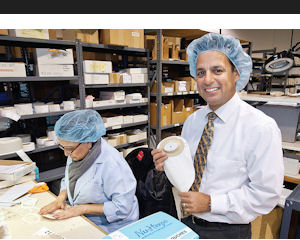For years, the employees at Nu-Hope Laboratories Inc. received end-of-year bonuses for their work at the family-owned Pacoima manufacturer. Now, co-owner and President Bradley Galindo is going to have to see whether that tradition will continue, or if it falls to cost cutting measures. The issue: a new 2.3 percent excise tax medical device makers will begin paying in January as part of federal health care reform. Galindo is not a fan of the tax and is a member of a chorus of opponents who say it will harm small manufacturers, lead to cost cutting and loss of jobs, and stifle innovation in the industry. Nu-Hope is a maker of hernia belts and customized “ostomy” products such a colostomy bags used after intestinal and urinary tract surgery. It has already taken steps to keep costs in check. Raises have not been offered for three years and its previously 100-percent covered health care package was modified a few years ago so employees kick in a small percentage. Will the bonuses be on the chopping block? “Next year I’ll look at the books and finances to see if it is feasible to offer it,” Galindo said. The medical device excise tax will be paid based on the amount of sales a manufacturer makes, regardless of whether the company turns a profit. The tax is expected to raise $30 billion over 10 years to fund the nation’s health care programs. The tax does not apply to eyeglasses, contact lenses and hearing aids or to products shipped for export. Nu-Hope had sales of $4 million in 2011 and Galindo said he expects to reach the same amount for this year. The excise tax would take $92,000 from those sales, money that Galindo would rather keep for the company to devise ways to enhance its products. “We’ll have to pass (the cost) on,” Galindo said. “We cannot incur it.” Niche player Nu-Hope is typical of the size of medical device makers in the United States. While the market has dominant players with thousands of employees such as St. Jude Medical Inc. in St. Paul, Minn., Boston Scientific Corp. of Natick, Mass. and Medtronic Inc. of Minneapolis – all of which have operations in the greater Valley area – 80 percent of manufacturers in the industry have 50 or fewer employees, said Brendan Benner, vice president of public affairs for the Medical Device Manufacturers Association, a Washington, D.C.-based trade group. Even before the excise tax was being collected, some of these larger companies reorganized themselves as way to cut costs amid the recession. St. Jude reduced its workforce this fall by several hundred employees, including at its Sylmar facility, and Boston Scientific prepared to do the same. Other cost saving measure may include sending manufacturing jobs overseas or cutting back on research and development, said Bruce Jackson, an analyst with Northland Capital Markets in Minneapolis who follows the medical device industry. “All the companies have been talking about this topic for several quarters,” Jackson said. Medical device spending in the United States hit $156 billion in 2010, according to an October 2012 study done for the Advanced Medical Technology Association, another trade group in the nation’s capital that represents medical device makers. That figure was 6 percent of the overall $2.5 trillion in health care spending in 2010. Nu-Hope does not sell retail but instead supplies wholesalers, small independent pharmacies, nursing homes and medical equipment companies. Its main competition are much larger entities: Danish company Coloplast A/S, Luxembourg-based ConvaTec Healthcare B S.a.r.l. and Hollister Inc. of Libertyville, Ill. Still, by passing the 2.3-percent increase on to his customers, Galindo said he anticipates some decline in orders by customers who will switch to the larger competitors. “They offer wholesalers bulk pricing so the cost is lower and it has a better profit margin,” he said. With the tax set to take effect in less than a month, the political opposition holds out hope Congress will act to kill it. In June, the House approved a measure to repeal the excise tax. Last month, more than 800 companies, trade groups, medical association and venture capital firms sent a letter to the Senate leadership seeking repeal as well. The letter, supported by the Medical Device Manufacturers Association and the Advanced Medical Technology Association, argued that without repeal the industry will see reduced operations, new product development and employment levels. Ultimately, however, it will be up to the Obama administration to make the decision.
